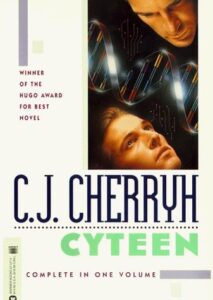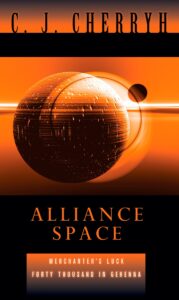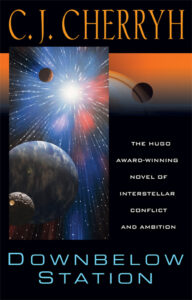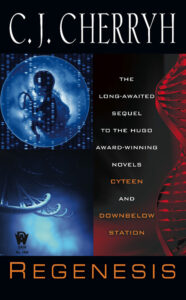
For no apparent reason, a month or two ago I found myself picking up Cyteen by C.J. Cherryh, which I’d read in college, found gripping and completely incomprehensible, and never reread. This sent me on a Cherryh spree that I pulled myself out of only because I had (and still have) a lot of reading to do for Readercon.
Anyway, for the sake of time I’m not going to put a lot of effort into summarizing the books I read, which were Cyteen; 40,000 in Gehenna; Downbelow Station; and Regenesis: two of these are Hugo Award winners, Cherryh is a major author, there’s lots of reviews and summaries out there.
Cyteen made a lot more sense this time around, though I did immediately have to reread it to determine whether it was just me, or whether a couple of key characters were in fact genuinely inscrutable or got their characterization too late in the game. (I think it was the latter.) I understand why people bounce off (1) the opening in-universe textbook excerpt and (2) the first third of the novel, but I loved both of them and wouldn’t suggest anyone skip them. The first of those is perhaps the more unusual: I do love an in-universe document generally, but I think I must click with Cherryh’s prose particularly well, to say "hell yeah, here we go" upon opening a novel to:
Verbal Text from:
THE HUMANE REVOLUTION
“The Company Wars”: #1
Reseune Educational Publications: 4668-1368-1
approved for 80+
Imagine all the variety of the human species confined to a single world, a world sown with the petrified bones of human ancestors, a planet dotted with the ruins of ten thousand years of forgotten human civilizations—a planet on which at the time human beings first flew in space, humans still hunted a surplus of animals, gathered wild plants, farmed with ancient methods, spun natural yarns by hand and cooked over wood fires.
And while the first third is a horror show because it’s got Ari I in full swing, that’s why it’s important—a book that’s about recreating Ari I needs to have that perspective in it.
Anyway, this doesn’t hold up quite as well upon a close second read because of the characterization stuff I mentioned before, but it is very close to brilliant, I think: it’s remarkably wide in scope and ambitious as well as being intensely claustrophobic, which is a good trick. The density, hothouse atmosphere, unreliability, and deeply fucked up abusive relationships all remind me of the Locked Tomb, if that’s useful, though its narrative voice is nowhere near as distinctive.
Of course one of the things about Cyteen is that Ari I is extremely wrong about at least one thing that the reader can determine: true brilliance does not mean that literally every other person in the universe is incapable of understanding you. This is both deeply anti-scientific of her [*] and typical of her arrogance—an arrogance that is enabled and encouraged by Union society, to be fair. Between knowing that she’s demonstrably fallible, and the way Cyteen is haunted by whatever happened on the planet Gehenna, 40,000 in Gehenna was the obvious thing for me to pick up next.
[*] Chad literally wrote a whole book about this!

And 40,000 is just a really great book, more successful than Cyteen in my opinion. It was actually written before Cyteen, and I’d love to know what it was like reading them in that order! But it’s hard to talk about because I’m not sure what constitutes a spoiler for it. There is what you get in Cyteen, which is that Union landed 40,000 colonists, mostly azi, on a planet and deliberately abandoned them there in order to deny the planet to Alliance. During Cyteen, it becomes a political crisis because Alliance has now found the planet and determined that the colonists had "devolved into a primitive lifestyle." I guess I can say that the book spans about two hundred years, with time jumps of varying lengths, and that in places it gives me Steerswoman vibes (or the other way around given the timing, though I don’t know if Kirstein has talked about Cherryh as an influence). I think my only critique is that there’s some gender stuff that feels maybe a smidge on the nose? But on the whole it’s an impressive and enjoyable book and a great showcase of Cherryh’s range, especially back-to-back with Cyteen.

Next I read Downbelow Station, which is set during the Alliance-Union war and is told from the POVs of various Alliance characters. Cherryh says, in the introduction to the 20th anniversary edition, that in order to keep the book’s size down she "took out all the transitional and descriptive bits in a final edit." Don Wollheim sent it right back to her to put them back in, Betsy Wollheim added in the scene headings, and "DAW created a new size category to make it possible to publish the book uncut"—does anyone know what that means? Anyway, good editing, Wollheims; so much of the tension of the book comes from seeing this entire fragile space station from so many perspectives and really understanding what’s at stake.
This book is a little more morally simplistic than the others here, which mostly was a relief, honestly—characters who both mean well and have some ability to do well! Unfortunately, it does result in a somewhat stereotypical "primitive friendly native" depiction of the hisa, the species indigenous to the planet that Downbelow orbits. I’m told they get developed more in Finity’s End, and I very much wanted to dive into that and the rest of the Company Wars books after finishing Downbelow.

Unfortunately, as mentioned above, Readercon calls, so I turned to Regenesis as a way of easing myself out of this Cherryh binge. This is the many-years-later sequel to Cyteen, which I expected to be disappointing based on the unanimous reactions of my friends, and I was correct. Its solution to "who murdered Ari I?" is so uninteresting that I reject that reality and substitute my own (actually Jo Walton’s final suggestion in this post). On the personal level it’s mostly Ari II trampling every boundary she sees, in ways that I’m uncomfortably unsure whether the narrative disapproves of, and on the plot level it’s all internal Union political maneuvering and no sociogenesis. I genuinely cannot recommend it no matter how much one wants to know what happens after Cyteen. (And on the strength of four whole books, I’m prepared to boldly declare that 40,000 is what happens, in all the ways that matter.)
Ending on Regenesis did have me tempted to read just one more! to finish on a stronger note, but I managed to not eat that potato chip, and I look forward to getting back to these books soon-ish!
I’ve put up a spoiler post mostly for gossiping about the characters.